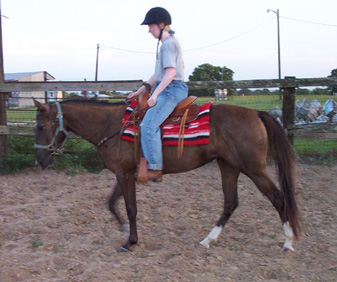


|
Belara's owners had purchased her as a three-month-old foal. She was adorable - and lonely after being weaned at a young age - so they spent most of their free time with her. She was so cute and they felt sorry for her, so they never discplined her - even if she bit or kicked at them. As she grew, she learned that her owners would not discpline her, and she began testing her boundaries more and more often. If she did not want to do something or wanted to be left alone, she bit or kicked at her owners. Before long, whenever she pinned her ears, they backed off and left her alone. By the time she was placed with a horse rescue, she was in charge of her human handlers. When Belara arrived, The Equine Behaviorist's first job was to set down some ground rules. If Belara pinned her ears, Jennifer did not back off but instead continued whatever she was doing. If Belara bit or kicked at her, Jennifer immediately discplined her. At first, Jennifer tried using a strong and loud "NO" whenever Belara kicked or bit at her. However, Belara was indifferent to a loud voice. If Belara was on a lead or line line and attempted to bite, Jennifer would jerk the leadrope and tell her no. If Belara kicked at her, Jennifer would "kick back" by smacking her side or hip. Jennifer would never hit or smack Belara around the face. At first, Belara became even more aggressive. She had never had to mind a human handler and she did not understand what was expected of her. If she kicked at Jennifer and was corrected, she would kick again. Each time she attempted to kick her, Jennifer would immediately and calmy discipline her. They key to stopping aggressive behavior is to consistently correct the behavior each time it occurs. While Jennifer was working with Belara, she also generously rewarded Belara when she behaved well. When Belara did what was asked of her, she was petted, verbally praised, and occassionally given a treat such as a bit of carrot or a horse cookie. Jennifer wanted to make it clear to Belara: Bad behavior earned swift discpline while good behavior earned rewards. It took Belara about a week to make the connection and to stop kicking and biting. After that week, Belara never kicked or bit at Jennifer again and she was also much easier for other people to handle. The Equine Behaviorist cautions any handler that dealing with such behaviors can be dangerous. Horses can seriously injure or even kill handlers with a well-placed bite or kick. The best way to avoid these problems is to always discipline your horse if he or she bites or kicks at you - even if your horse is very young. Letting babies get away with bad behaviors just sets them up for more difficulties down the road. If you acquire a horse with these behavioral problems, seek professional help. Belara went on to become a nice riding horse. She was well-behaved and happy once she learned that kicking and biting would not be tolerated. |
|
|
(C) 2005 Jennifer Williams. All rights reserved. |
